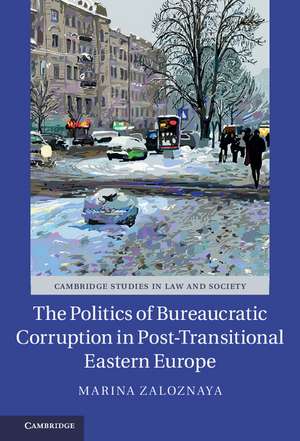The Politics of Bureaucratic Corruption in Post-Transitional Eastern Europe: Cambridge Studies in Law and Society
Autor Marina Zaloznayaen Limba Engleză Hardback – 26 apr 2017
| Toate formatele și edițiile | Preț | Express |
|---|---|---|
| Paperback (1) | 282.10 lei 6-8 săpt. | |
| Cambridge University Press – 5 dec 2018 | 282.10 lei 6-8 săpt. | |
| Hardback (1) | 569.82 lei 6-8 săpt. | |
| Cambridge University Press – 26 apr 2017 | 569.82 lei 6-8 săpt. |
Din seria Cambridge Studies in Law and Society
-
 Preț: 217.44 lei
Preț: 217.44 lei -
 Preț: 233.96 lei
Preț: 233.96 lei -
 Preț: 217.08 lei
Preț: 217.08 lei -
 Preț: 207.99 lei
Preț: 207.99 lei -
 Preț: 168.85 lei
Preț: 168.85 lei -
 Preț: 274.60 lei
Preț: 274.60 lei -
 Preț: 289.76 lei
Preț: 289.76 lei -
 Preț: 237.42 lei
Preț: 237.42 lei -
 Preț: 236.96 lei
Preț: 236.96 lei -
 Preț: 318.50 lei
Preț: 318.50 lei -
 Preț: 290.77 lei
Preț: 290.77 lei - 11%
 Preț: 559.13 lei
Preț: 559.13 lei -
 Preț: 185.40 lei
Preț: 185.40 lei - 9%
 Preț: 661.47 lei
Preț: 661.47 lei - 9%
 Preț: 694.92 lei
Preț: 694.92 lei -
 Preț: 176.91 lei
Preț: 176.91 lei -
 Preț: 177.28 lei
Preț: 177.28 lei -
 Preț: 169.28 lei
Preț: 169.28 lei -
 Preț: 201.39 lei
Preț: 201.39 lei - 9%
 Preț: 695.23 lei
Preț: 695.23 lei -
 Preț: 163.31 lei
Preț: 163.31 lei -
 Preț: 289.76 lei
Preț: 289.76 lei -
 Preț: 279.65 lei
Preț: 279.65 lei -
 Preț: 295.08 lei
Preț: 295.08 lei - 14%
 Preț: 723.92 lei
Preț: 723.92 lei -
 Preț: 375.68 lei
Preț: 375.68 lei -
 Preț: 327.30 lei
Preț: 327.30 lei - 14%
 Preț: 725.57 lei
Preț: 725.57 lei -
 Preț: 392.55 lei
Preț: 392.55 lei - 14%
 Preț: 839.50 lei
Preț: 839.50 lei -
 Preț: 379.07 lei
Preț: 379.07 lei -
 Preț: 429.12 lei
Preț: 429.12 lei -
 Preț: 375.68 lei
Preț: 375.68 lei - 11%
 Preț: 689.87 lei
Preț: 689.87 lei - 11%
 Preț: 694.91 lei
Preț: 694.91 lei - 14%
 Preț: 729.73 lei
Preț: 729.73 lei -
 Preț: 373.56 lei
Preț: 373.56 lei -
 Preț: 422.47 lei
Preț: 422.47 lei - 14%
 Preț: 727.72 lei
Preț: 727.72 lei -
 Preț: 308.12 lei
Preț: 308.12 lei -
 Preț: 398.54 lei
Preț: 398.54 lei - 14%
 Preț: 727.07 lei
Preț: 727.07 lei - 14%
 Preț: 726.42 lei
Preț: 726.42 lei - 14%
 Preț: 781.19 lei
Preț: 781.19 lei - 11%
 Preț: 461.43 lei
Preț: 461.43 lei
Preț: 569.82 lei
Preț vechi: 640.25 lei
-11% Nou
Puncte Express: 855
Preț estimativ în valută:
109.03€ • 114.16$ • 90.44£
109.03€ • 114.16$ • 90.44£
Carte tipărită la comandă
Livrare economică 10-24 aprilie
Preluare comenzi: 021 569.72.76
Specificații
ISBN-13: 9781107184312
ISBN-10: 1107184312
Pagini: 200
Ilustrații: 2 b/w illus. 8 tables
Dimensiuni: 160 x 237 x 18 mm
Greutate: 0.48 kg
Editura: Cambridge University Press
Colecția Cambridge University Press
Seria Cambridge Studies in Law and Society
Locul publicării:New York, United States
ISBN-10: 1107184312
Pagini: 200
Ilustrații: 2 b/w illus. 8 tables
Dimensiuni: 160 x 237 x 18 mm
Greutate: 0.48 kg
Editura: Cambridge University Press
Colecția Cambridge University Press
Seria Cambridge Studies in Law and Society
Locul publicării:New York, United States
Cuprins
Introduction; 1. Beyond transition: political turnover and bureaucratic corruption in hybrid regimes; 2. The secret life of universities in post-Soviet Ukraine; 3. Fear and transparency in the universities of post-Soviet Belarus; 4. High political turnover and cross-organizational variation in corruption in post-Soviet Ukraine; 5. Low political turnover and cross-sectoral variation in corruption in post-Soviet Belarus; Conclusion.
Recenzii
'This book develops a new and nuanced perspective on the political roots of corruption. It challenges the predominant explanation of post-communist corruption as a side-effect of recent tumultuous transitions to democracy. Transcending the usual sensationalism and moralism of corruption studies, Marina Zaloznaya provocatively demonstrates that transparency, or absence of corruption, may be harmful to citizens of non-democratic societies. The book outlines the basic principles of a sociology of corruption in ways not previously available. Zaloznaya's book is the most comprehensive empirical analysis of the roots of corruption to date, using data sources that are unprecedented in previous corruption studies.' John Hagan, John D. MacArthur Professor of Sociology and Law, Northwestern University, Illinois, and Co-Director, Center on Law and Globalization, American Bar Foundation
'Zaloznaya's book presents a strikingly original study of corruption in universities and other bureaucracies within post-Soviet Ukraine and Belarus, exposing and explaining significant variations in corrupt practices across country, sector, and organization. Bravo!' Peter H. Solomon, Jr, University of Toronto
'This book provides a welcome corrective to the common wisdom that all post-Soviet countries are hopelessly and inevitably riddled with corruption. Through a creative combination of methodologies, Marina Zaloznaya documents striking differences in the nature and extent of corruption in higher education in Ukraine and Belarus. She draws the reader in with well-chosen examples from her field research that are integrated into her larger theoretical argument. With regard to both case studies, her granular approach reveals remarkable variations in attitudes towards bribery that uncover the day-to-day realities for students and their professors. Zaloznaya's work reminds us that context matters for both institutions and individuals and that we should resist sweeping generalizations about regions and individual countries. More importantly, she convincingly debunks the myth that corruption is an inescapable result of the transition from state socialism to democracy.' Kathryn Hendley, William Voss-Bascom Professor of Law and Political Science, University of Wisconsin, Madison
'It has been more than seventy-five years since white collar crime became a recognized and actively targeted form of misconduct. Although democracy advocates and liberal economists promote the idea of public integrity as a fundamental condition for regime stability, The Politics of Bureaucratic Corruption shows how variations in kinds and degrees of corruption can flourish within and across nation states in Eastern Europe. Citizens actively choose among legal and extra legal ways to obtain bureaucratic services as pragmatic, locally specific practices. With rich and varied data, the book contributes to the growing literature looking at the mythologies of capitalist and democratic transitions, offering a subtle, nuanced analysis of the importance of persistent organizational cultures.' Susan S. Silbey, Leon and Anne Goldberg Professor of Humanities, Sociology, Anthropology, and Behavioral and Policy Sciences, Massachusetts Institute of Technology
'Marina Zaloznaya offers a historically grounded, comparatively verified and ethnographically tested analysis that challenges the top-down approaches associated with the transition paradigm, the global corruption paradigm and the country-based measurement of corruption perceptions. Her study highlights the role of the context, disaggregates the notion of corruption, and emphasizes regional, rather than national, dimensions in corrupt practices in education and health provision in Ukraine and Belarus - on par with the latest innovations in corruption studies overall.' Alena Ledeneva, University College London
'Using a mix of ethnographic, survey, and comparative historical methodologies, this book offers insight into the corruption economies of Ukrainian and Belarusian universities, hospitals, and secondary schools.' Howard S. Erlanger, Law and Social Inquiry
'Zaloznaya's book presents a strikingly original study of corruption in universities and other bureaucracies within post-Soviet Ukraine and Belarus, exposing and explaining significant variations in corrupt practices across country, sector, and organization. Bravo!' Peter H. Solomon, Jr, University of Toronto
'This book provides a welcome corrective to the common wisdom that all post-Soviet countries are hopelessly and inevitably riddled with corruption. Through a creative combination of methodologies, Marina Zaloznaya documents striking differences in the nature and extent of corruption in higher education in Ukraine and Belarus. She draws the reader in with well-chosen examples from her field research that are integrated into her larger theoretical argument. With regard to both case studies, her granular approach reveals remarkable variations in attitudes towards bribery that uncover the day-to-day realities for students and their professors. Zaloznaya's work reminds us that context matters for both institutions and individuals and that we should resist sweeping generalizations about regions and individual countries. More importantly, she convincingly debunks the myth that corruption is an inescapable result of the transition from state socialism to democracy.' Kathryn Hendley, William Voss-Bascom Professor of Law and Political Science, University of Wisconsin, Madison
'It has been more than seventy-five years since white collar crime became a recognized and actively targeted form of misconduct. Although democracy advocates and liberal economists promote the idea of public integrity as a fundamental condition for regime stability, The Politics of Bureaucratic Corruption shows how variations in kinds and degrees of corruption can flourish within and across nation states in Eastern Europe. Citizens actively choose among legal and extra legal ways to obtain bureaucratic services as pragmatic, locally specific practices. With rich and varied data, the book contributes to the growing literature looking at the mythologies of capitalist and democratic transitions, offering a subtle, nuanced analysis of the importance of persistent organizational cultures.' Susan S. Silbey, Leon and Anne Goldberg Professor of Humanities, Sociology, Anthropology, and Behavioral and Policy Sciences, Massachusetts Institute of Technology
'Marina Zaloznaya offers a historically grounded, comparatively verified and ethnographically tested analysis that challenges the top-down approaches associated with the transition paradigm, the global corruption paradigm and the country-based measurement of corruption perceptions. Her study highlights the role of the context, disaggregates the notion of corruption, and emphasizes regional, rather than national, dimensions in corrupt practices in education and health provision in Ukraine and Belarus - on par with the latest innovations in corruption studies overall.' Alena Ledeneva, University College London
'Using a mix of ethnographic, survey, and comparative historical methodologies, this book offers insight into the corruption economies of Ukrainian and Belarusian universities, hospitals, and secondary schools.' Howard S. Erlanger, Law and Social Inquiry
Notă biografică
Descriere
A detailed analysis of the corruption economies of Ukrainian and Belarusian bureaucracies and their roots in post-transitional politics.

















